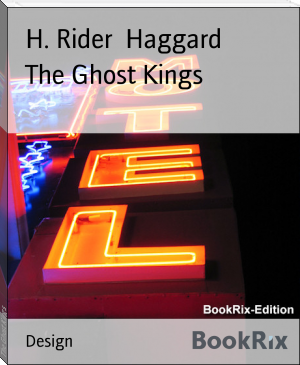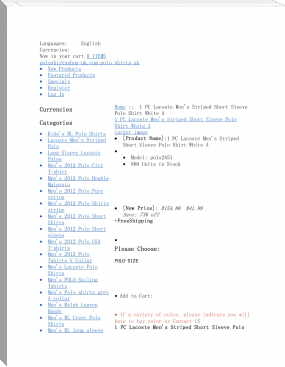The Ghost Kings, H. Rider Haggard [best thriller books to read TXT] 📗

- Author: H. Rider Haggard
Book online «The Ghost Kings, H. Rider Haggard [best thriller books to read TXT] 📗». Author H. Rider Haggard
Next morning, whilst Rachel sat by the pool in which, once she had seen the vision of Richard, Tamboosa and an escort came to bring her to Dingaan. When they told her this, she said neither yea nor nay, but, refusing to enter a litter they had brought, walked at the head of them, back to the Great Place, and, watched by thousands, through the locust-strewn streets to the Intunkulu, the House of the King. Here, in front of his hut, and surrounded by his Council, sat Dingaan and the indunas who rose to greet her with the royal salute. She advanced towards them slowly, looking more beautiful than ever she had done, but with wild, wandering eyes. They set a stool for her, and she sat down on the stool, staring at the ground. Then as she said nothing, Dingaan, who seemed very sad and full of fear, commanded Tamboosa to report all that had happened in the ears of the Council, and he took up his tale.
He told of the journey to the Tugela, and of how the Inkosazana and the white lord, Dario, had crossed the river alone but a few hours after Ibubesi, ordering him to follow next day, also alone, with the white ox that bore her baggage. He told how he had done so, and on reaching Ramah had found the white Umfundusi and his wife lying dead in their room, and on the floor of it a Zulu of the men who had been sent with Ibubesi, also dead, and in the garden of the house a man of the people of Ibubesi, dying, who, with his last breath narrated to him the story of the taking of the Inkosazana and the white lord, by Ibubesi. He told of how he had run to the town of Mafooti, to find out the truth, and of the message that he had sent by the herd boy to Ibubesi and his people. Lastly he told all the rest of that story, of how he had come back to Zululand "as though he had wings," and finding the regiment that had escorted the Inkosazana still in camp near the river, had returned with them to attack Mafooti, which they discovered to be deserted by its people.
While he described how by the flare of the lightning they saw the Inkosazana standing on the roof of a hut, how they captured the wild beast, Ibubesi, how they learned that the Spirit of the Inkosazana was "wandering," and the dreadful words she said, the burning of Mafooti, and the fearful death of Ibubesi by fire, all the Council listened in utter silence. Thus they listened also whilst he showed how evil after evil had fallen upon the regiment, evil by fire and water and sickness, as evil had fallen upon the land also by the plague of locusts.
At length Tamboosa's story was finished, and certain men were brought forward bound, who had been the captains of the band that went with Ishmael, among them those who had killed, or caused to die, the white teacher and his wife.
Upon the stern command of the King these men also told their story, saying that they had not meant to kill the white man and that what they did was done at the word of Ibubesi, whom they were ordered to obey in all things, but who, as they now understood, had dared to lay a plot to capture the Inkosazana for himself. When they had finished the King rose and poured out his wrath on them, because through their deeds the Spirit of the Inkosazana had been driven away, and her curse laid upon the land, where already it was at work. Then he commanded that they should be led thence, all of them, and put to a terrible death, and with them those captains of the regiment who had spoken against the following of the people of Mafooti, who should, he said, have been destroyed, every one.
At his words executioners rushed in to seize these wretched men, and then it was that Rachel, who all this while had sat as though she heard nothing, lifted her head and spoke, for the first time.
"Set them free, set them, free!" she commanded. "Vengeance is from Heaven, and Heaven will pour it out in plenty. Not on my hands, not on my hands shall be the blood of those who sent the Spirit of the Inkosazana to wander in the skies. Who was it that bade an impi run to Ramah, and what did they there in the house of those who gave me birth? When the Master calls, the dogs must search and kill. Set them free, lest there be more blood between the Inkosazana and her people of the Zulus."
When he heard these words, spoken in a strange, wailing voice, Dingaan trembled, for he knew that it was he who had bidden his dogs to run.
"Let them go," he said, "and let the land see them no more for ever."
So those men went thankfully enough, and the land saw them no more. As they passed the gate other men entered, starved and hungry-looking men, whose bones almost pierced their skins, and who carried in their hands remnants of shields that looked as though they had been gnawed by rats. They saluted the King with feeble voices, and squatted down upon the ground.
"Who are those skeletons," he asked angrily, "who dare to break in upon my Council?"
"King," answered their spokesman, "we are captains of the Nobambe, the Nodwenge, and the Isangu regiments whom thou didst send to destroy the chief, Madaku and his people, who dwell far away in the swamp land to the north near where the Great River runs into the sea. King, we could not come at this chief because he fled away on rafts and in boats, he and his people, and we lost our path among the reeds where again and again we were ambushed, and many of us sank in the swamps and were drowned. Also, we found no food, and were forced to live upon our shields," and he held up a gnawed fragment in his hand. "So we perished by hundreds, and of all who went forth but twenty-one times ten remain alive."
When Dingaan heard this he groaned, for his arms had been defeated and three of his best regiments destroyed. But Rachel laughed aloud, the terrible laugh at which all who heard it shivered.
"Did I not say," she asked, "that Heaven would pour out its vengeance in plenty because of the blood that runs between the Spirit of the Inkosazana and her people of the Zulus?"
"Truly this curse works fast and well," exclaimed Dingaan. Then, turning to the men, he shouted: "Be gone, you starved rats, you cowards who do not know how to fight, and be thankful that the Great Elephant (Chaka) is dead, for surely he would have fed you upon shields until you perished."
So these captains crept away also.
Ere they were well gone a man appeared craving audience, a fat man who wore a woeful countenance, for tears ran down his bloated cheeks. Dingaan knew him well, for every week he saw him, and sometimes oftener.
"What is it, Movo, keeper of the kine," he asked anxiously, "that you break in on me thus at my Council?"
"O King," answered the fat man, "pardon me, but, O King, my tidings are so sad that I availed myself of my privilege, and pushed past the guards at the gate."
"Those who bear ill news ever run quickly," grunted the King. "Stop that weeping and out with it, Movo."
"Shaker of the Earth! Eater up of Enemies!" said Movo, "thou thyself art eaten up, or at least thy cattle are, the cattle that I love. A sore sickness has fallen on the great herd, the royal herd, the white herd with the twisted horns, and," here he paused to sob, "a thousand of them are dead, and many more are sick. Soon there will be no herd left," and he wept outright.
Now Dingaan leapt up in his wrath and struck the man so sharply with the shaft of the spear he held that it broke upon his head.
"Fat fool that you are," he exclaimed. "What have you done to my cattle? Speak, or you shall be slain for an evil-doer who has bewitched them."
"Is it a crime to be fat, O King," answered the indignant Movo, rubbing his skull, "when others are so much fatter?" and he looked reproachfully at Dingaan's enormous person. "Can I help it if a thousand of thy oxen are now but hides for shields?"
"Will you answer, or will you taste the other end of the spear?" asked Dingaan, grasping the broken shaft just above the blade. "What have you done to my cattle?"
"O King, I have done nothing to them. Can I help it if those accursed beasts choose to eat dead locusts instead of grass, and foam at the mouth and choke? Can the cattle help it if all the grass has become locusts so that there is nothing else for them to eat? I am not to blame, and the cattle are not to blame. Blame the Heavens above, to whom thou, or rather," he added hastily, "some wicked wizard must have given offence, for no such thing as this has been known before in Zululand."
Again Rachel broke in with her wild laughter, and said:
"Did I not tell thee that vengeance would be poured down in plenty, poured down like the rain, O Dingaan? Vengeance on the King, vengeance on the people, vengeance on the soldiers, vengeance on the corn, vengeance on the kine, vengeance on the whole land, because blood runs between the Spirit of the Inkosazana and the race of the Amazulu, whom once she loved!"
"It is true, it is true, White One, but why dost thou say it so often?" groaned the maddened Dingaan. "Why show the whip to those who must feel the blow? Now, you Movo, have you done?"
"Not quite, O King," answered the melancholy Movo, still rubbing his head. "The cattle of all the kraals around are dying of this same sickness, and the crops are quite eaten, so that next winter everyone must perish of famine."
"Is that all, O Movo?"
"Not quite, O King, since messengers have come to me, as head keeper of the kine, to say that all the other royal herds within two days' journey are also stricken, although if I understand them right, of some other pest. Also, which I forgot to add--"
"Hunt out this bearer of ill-tidings," roared Dingaan, "hunt him out, and send orders that his own cattle be taken to fill up the holes in my blanket."
Now some attendants sprang on the luckless Movo and began to beat him with their sticks. Still, before he reached the gates he succeeded in turning round weeping in good earnest and shouted:
"It is quite useless, O King, all my cattle are dead, too. They will find nothing but the horns and the hoofs, for I have sold the hides to the shield-makers."
Then they thrust him forth.
He was gone, and for a while there was silence, for despair filled the hearts of the King and his Councillors, as they gazed at Rachel dismayed, wondering within themselves how they might be rid of her and of the evils which she had brought upon them because of the blood of her people which lay at her doors.
Whilst they still stared thus in silence yet another messenger came running through the gate like one in great haste.
"Now I am minded to order this fellow to be killed before he opens his mouth," said Dingaan, "for of a surety he also is a bearer of ill-tidings."
"Nay, O King," cried out the man in alarm, "my news is only that an embassy awaits without."
"From whom?" asked Dingaan anxiously. "The white Amaboona?"
"Nay, O King, from the queen of the Ghost-people to whom thou didst





Comments (0)